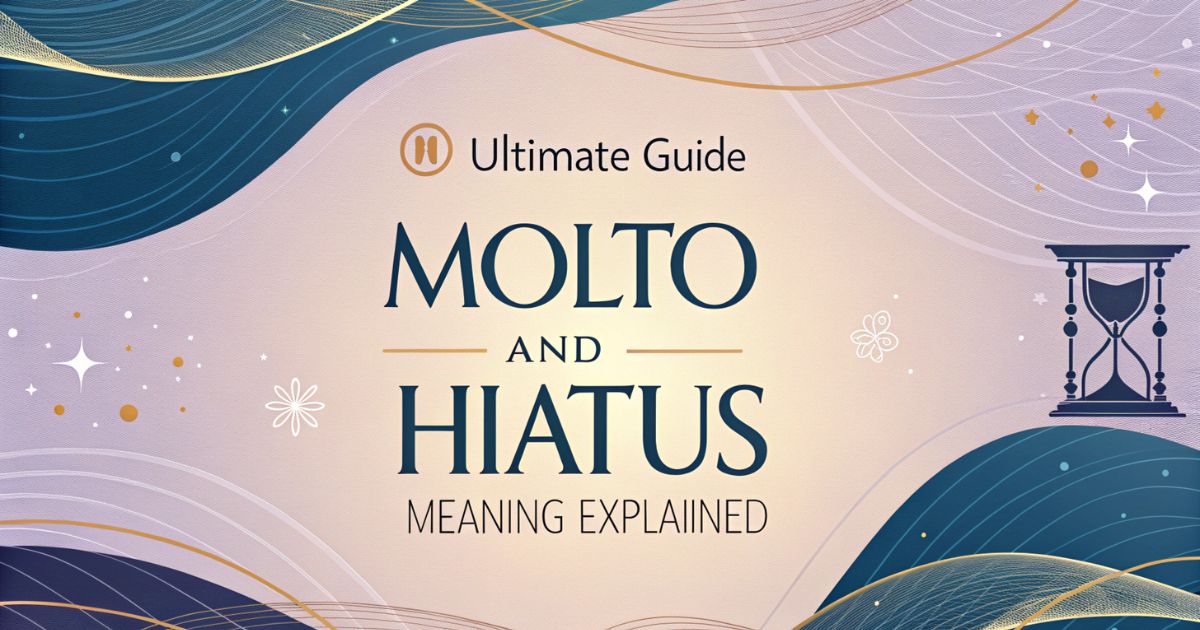You’ve probably encountered these two words countless times – molto in classical music or Italian conversations, and hiatus when your favorite show suddenly disappears.
Understanding these terms opens doors to richer cultural appreciation and clearer communication. Let’s decode their meanings, usage, and cultural significance once and for all.
What Does Molto Actually Mean and Why You Keep Hearing It Everywhere
Molto is an Italian adverb meaning “very” or “much.” It’s ubiquitous in musical terminology, appearing in compositions from Bach to Beethoven.
In everyday Italian, molto bene means “very well,” while molto grazie translates to “thank you very much.” Musicians encounter it constantly in sheet music directions.
The word derives from Latin “multum,” sharing roots with English words like “multiple” and “multitude.” This etymology explains why molto intensifies whatever follows it.
You’ll spot molto in restaurant menus, opera programs, and classical music performances across America. Italian-Americans frequently pepper their conversations with this versatile intensifier.
Modern usage has expanded beyond traditional contexts. Food critics describe dishes as molto delizioso, while travel bloggers praise destinations as molto bello.
The Complete Definition of Hiatus Beyond Just Taking a Break
A hiatus represents a deliberate pause or gap in continuity, differing significantly from permanent endings or cancellations.
The term originates from Latin “hiare,” meaning “to gape” or “yawn.” This etymology captures the sense of an opening or void in normal proceedings.
Hiatuses occur across multiple domains: entertainment, academia, business, and personal life. Each context carries specific implications and expectations.
Unlike breaks or vacations, a hiatus typically involves uncertainty about return timing. It’s more structured than a simple pause but less definitive than a conclusion.
Legal definitions vary by industry. Employment hiatuses might affect benefits, while academic ones impact enrollment status and financial aid eligibility.
Molto vs Very Understanding the Nuanced Difference That Changes Everything
While both molto and “very” function as intensifiers, their cultural connotations differ dramatically.
Molto carries Mediterranean warmth and expressiveness. Saying molto grazie feels more passionate than plain “thank you very much.”
Native Italian speakers use molto with greater emotional range than English speakers use “very.” It’s more emphatic, more theatrical.
In musical contexts, molto indicates not just intensity but cultural authenticity. Composers chose it specifically for its Italian musical heritage.
American musicians studying classical pieces must understand that molto allegro conveys different energy than “very fast.” The Italian carries centuries of performance tradition.
How Musicians Use Molto to Transform Their Performances Instantly
Molto appears in countless musical directions, each transforming the piece’s character entirely.
Molto ritardando instructs musicians to slow down significantly, creating dramatic tension. It’s more extreme than simple “ritardando.”
Pianists encounter molto legato, demanding exceptionally smooth, connected playing. This technique separates amateur from professional performances.
Orchestra conductors use molto markings to guide emotional interpretation. Molto espressivo signals deep, heartfelt expression beyond technical accuracy.
String players particularly benefit from understanding molto vibrato versus regular vibrato. The difference creates entirely different sonic landscapes.
Real-World Examples of Molto in Classical Music You’ve Definitely Heard
Beethoven’s Symphony No. 9 features molto vivace in its second movement, creating that recognizable energetic drive.
Mozart’s “Eine kleine Nachtmusik” opens with molto allegro, establishing its cheerful, spirited character from the first notes.
Chopin’s nocturnes frequently employ molto cantabile, instructing pianists to sing through their instruments with exceptional lyricism.
Vivaldi’s “Four Seasons” showcases molto in various forms, painting musical pictures of weather and seasonal changes.
Bach’s Brandenburg Concertos demonstrate how molto markings guide ensemble coordination and individual expression simultaneously.
Why Your Favorite TV Show Went on Hiatus Instead of Getting Canceled
Television hiatuses serve strategic purposes beyond simple scheduling convenience.
Networks use hiatuses to avoid competing with major events like Olympics or award seasons. This protects viewership numbers and advertising revenue.
Creative teams often need hiatuses for script development, location scouting, or addressing cast changes. Quality suffers without adequate preparation time.
Hiatus announcements generate anticipation and media coverage, often boosting interest more than continuous broadcasting.
International distribution deals frequently require hiatuses to coordinate global release schedules and maximize international revenue streams.
The Psychology Behind Strategic Hiatuses in Entertainment Industry
Hiatuses create scarcity, making audiences value content more highly upon return.
Psychological studies show that anticipated pleasure often exceeds actual pleasure. Hiatuses exploit this cognitive bias effectively.
Social media amplifies hiatus effects through fan speculation and theory-sharing. This organic marketing costs nothing but generates massive engagement.
Streaming platforms use data analytics to optimize hiatus timing, analyzing viewing patterns and competition schedules.
Celebrity hiatuses often coincide with personal branding campaigns, book releases, or other career ventures requiring focused attention.
Molto Allegro vs Allegro Technical Music Terms That Actually Matter
Allegro indicates a fast, lively tempo, typically around 120-168 beats per minute.
Molto allegro pushes this further, demanding even greater speed and energy. Think race-car versus highway driving.
Professional musicians recognize that molto changes not just tempo but musical character entirely. It affects phrasing, articulation, and emotional delivery.
Orchestra members must adjust their playing technique for molto allegro passages, using different bow strokes and fingering patterns.
Music students often struggle with molto allegro because it requires advanced technical skills and exceptional coordination.
Celebrity Hiatus Announcements That Shocked Fans and Boosted Careers
Adele’s hiatus after her “25” tour generated unprecedented anticipation for her next album release.
Dave Chappelle’s unexpected hiatus from his Comedy Central show became entertainment industry legend, spawning documentaries and analysis.
Zayn Malik’s hiatus from One Direction shocked millions of fans but launched his successful solo career.
These strategic hiatuses often coincide with contract negotiations, personal growth periods, or creative reinvention phases.
Social media makes celebrity hiatuses more impactful, with fans analyzing every post for return hints.
Business Hiatuses When Companies Pause Operations for Strategic Reasons
Companies declare hiatuses for restructuring, rebranding, or market repositioning without admitting failure.
Technology firms use hiatuses to develop new products or pivot business models while maintaining market presence.
Restaurant chains might announce hiatuses for menu overhauls, kitchen renovations, or staff retraining programs.
Business hiatuses differ from closures because they maintain intellectual property, customer databases, and brand recognition.
Investors often view announced hiatuses more favorably than permanent shutdowns, maintaining some asset value.
Common Mistakes Americans Make When Using Molto in Conversation
Americans often mispronounce molto as “MOL-toe” instead of the correct “MOLE-toe” with rolled R sound.
Overusing molto makes speech sound pretentious rather than sophisticated. Native speakers use it selectively.
Mixing molto with English grammar creates awkward phrases like “molto very good” – redundant and incorrect.
Context matters enormously. Molto works in Italian restaurants but sounds forced in business meetings.
Americans sometimes use molto with non-Italian words, creating hybrid phrases that confuse rather than impress.
Medical Hiatuses Understanding Health-Related Career Breaks
Medical hiatuses protect both employee health and employer liability while maintaining employment relationships.
FMLA regulations govern medical hiatuses, ensuring job protection during serious health conditions.
Mental health hiatuses have gained acceptance, reducing stigma around psychological wellness in workplace settings.
Return-to-work protocols after medical hiatuses often involve gradual reintegration and accommodation requirements.
Documentation requirements for medical hiatuses vary by employer but typically require healthcare provider certification.
Molto Bene and Other Italian Phrases That Make You Sound Sophisticated
Molto bene (very well) works perfectly in casual conversation and shows cultural awareness.
Molto interessante (very interesting) elevates discussion while demonstrating language sophistication.
Molto delizioso enhances restaurant experiences and shows appreciation for Italian cuisine culture.
Molto gentile (very kind) expresses gratitude with Mediterranean warmth and sincerity.
Pronunciation matters crucially. Poor Italian pronunciation undermines sophistication attempts entirely.
The Cultural Impact of Social Media Hiatuses on Digital Detox Trends
Social media hiatuses have normalized digital wellness conversations across all age demographics.
Influencers use hiatuses strategically, returning with increased engagement and follower appreciation.
Digital detox hiatuses correlate with improved mental health outcomes according to recent psychological studies.
Corporate social media hiatuses during crises prevent PR disasters while allowing strategic response planning.
Young adults report feeling pressured to announce hiatuses rather than simply reducing usage quietly.
Academic Hiatuses Gap Years Sabbaticals and Educational Pauses Explained
Academic hiatuses include gap years, medical leaves, financial hardship breaks, and sabbatical programs.
College hiatuses affect financial aid eligibility, requiring careful planning and administrative coordination.
Professor sabbaticals represent institutionalized hiatuses designed for research, writing, and professional development.
International students face visa complications during academic hiatuses, requiring legal consultation.
Gap year hiatuses increasingly include structured programs rather than simple time off.
How to Use Molto Correctly in English Without Sounding Pretentious
Limit molto to appropriate contexts: Italian restaurants, music discussions, or cultural conversations.
Pair molto with Italian words rather than English ones for authentic usage.
Use confident pronunciation – hesitant delivery undermines sophistication attempts.
Understand your audience. Molto works with culturally aware listeners but confuses others.
Practice makes perfect. Awkward molto usage sounds worse than avoiding it entirely.
Historical Examples of Famous Hiatuses That Changed History
Shakespeare’s theater hiatuses during plague outbreaks led to some of his greatest written works.
The Beatles’ hiatus before “Sgt. Pepper’s” allowed individual growth that enhanced their collective creativity.
Gandhi’s political hiatuses for spiritual reflection strengthened his leadership and philosophical development.
These historical hiatuses demonstrate how strategic pauses can enhance rather than interrupt meaningful work.
Modern leaders study these examples when planning their own career hiatuses.
Molto Cantabile Advanced Musical Terms for Aspiring Musicians
Molto cantabile instructs musicians to play in an extremely singing, lyrical style.
This marking appears frequently in Romantic period compositions, demanding exceptional expressiveness.
String players achieve molto cantabile through specific bowing techniques and vibrato control.
Pianists must master legato touch and pedaling to execute molto cantabile passages effectively.
Molto cantabile separates advanced musicians from beginners through its interpretive demands.
The Economics of Entertainment Hiatuses and Their Financial Implications
Entertainment hiatuses involve complex financial calculations including production costs, marketing expenses, and revenue projections.
Streaming services use hiatuses to spread content costs across multiple fiscal quarters.
Actor contracts often include hiatus clauses affecting payment schedules and availability requirements.
International distribution deals influence hiatus timing to maximize global revenue potential.
Merchandise sales often spike during hiatuses as fans seek connection to absent content.
Regional Variations How Molto Usage Differs Across Italian Dialects
Northern Italian dialects use molto more conservatively than southern regions.
Sicilian Italian incorporates molto with different emotional intensity than Roman usage.
Italian-American communities developed unique molto usage patterns distinct from homeland Italian.
Regional pronunciation varies significantly, affecting how molto sounds in different Italian areas.
Language purists debate whether regional molto variations represent evolution or corruption.
Planning Your Own Strategic Hiatus Professional Tips for Career Success
Strategic hiatuses require careful financial planning and professional relationship maintenance.
Announce hiatuses professionally, emphasizing growth and return value rather than escape.
Network during hiatuses to maintain visibility and discover new opportunities.
Use hiatus time for skill development, education, or strategic planning.
Plan return strategies before beginning hiatuses to ensure smooth professional reintegration.
Molto Dolce vs Dolce Subtle Distinctions That Professional Musicians Know
Dolce means “sweetly” in musical terms, indicating gentle, tender expression.
Molto dolce intensifies this sweetness, demanding even greater delicacy and emotional sensitivity.
Professional musicians understand that molto changes not just dynamics but entire musical character.
These subtle distinctions separate amateur from professional musical interpretation.
Orchestra members must coordinate molto dolce passages to achieve unified emotional expression.
The Psychological Benefits of Taking Intentional Hiatuses from Work
Research demonstrates that planned hiatuses reduce burnout and increase long-term productivity.
Hiatuses allow psychological distance from work problems, enabling fresh perspective upon return.
Mental health professionals increasingly recommend strategic hiatuses for stress management.
Career hiatuses can prevent more serious mental health issues requiring extended treatment.
Employers benefit from employee hiatuses through reduced turnover and increased innovation.
Common Synonyms for Molto That Native English Speakers Actually Use
“Extremely,” “exceptionally,” and “remarkably” serve as molto alternatives in English conversation.
“Tremendously” and “immensely” carry similar intensifying power without foreign language barriers.
Context determines the best molto substitute – formal situations require different choices than casual conversation.
Regional American dialects prefer different intensifiers, from “mighty” in the South to “wicked” in New England.
Professional writing typically avoids molto in favor of standard English intensifiers.
Legal Implications of Employment Hiatuses and Sabbatical Agreements
Employment hiatuses require careful legal documentation to protect both employer and employee rights.
Benefits continuation during hiatuses varies by company policy and applicable employment law.
Return guarantees after hiatuses depend on written agreements and legal requirements.
International employees face visa complications during employment hiatuses.
Legal counsel helps navigate hiatus agreements to prevent misunderstandings and disputes.
Molto Espressivo Bringing Emotional Depth to Your Musical Understanding
Molto espressivo demands maximum emotional expression while maintaining technical precision.
This marking appears in works requiring deep interpretive maturity from performers.
Music educators use molto espressivo to develop students’ emotional connection to music.
Professional musicians spend years mastering the balance between molto espressivo and technical accuracy.
Molto espressivo passages often become the most memorable moments in musical performances.
Digital Age Hiatuses Social Media Breaks and Their Mental Health Impact
Digital hiatuses reduce anxiety and improve real-world relationship quality according to psychological research.
Social media platforms design features to discourage hiatuses, understanding their revenue implications.
Teenagers report peer pressure around social media hiatuses, feeling obligated to maintain online presence.
Digital hiatuses correlate with improved sleep quality and reduced comparison-based depression.
Mental health professionals increasingly prescribe structured social media hiatuses as therapeutic intervention.
Expert Tips for Explaining Molto and Hiatus to Non-Native English Speakers
Use concrete examples rather than abstract definitions when teaching molto and hiatus.
Connect molto to familiar English intensifiers students already understand.
Demonstrate hiatus through cultural references from students’ home countries.
Practice pronunciation repeatedly – both words challenge non-native speakers significantly.
Provide context-appropriate usage examples rather than isolated vocabulary instruction.
Conclusion
Molto and hiatus represent fascinating linguistic bridges between cultures and contexts.
Molto brings Italian passion to English expression, while hiatus offers sophisticated alternatives to simple “break” terminology. Mastering these terms enhances your cultural fluency and communication precision across multiple professional and personal domains.
More Posts
Chisme Meaning: A Cultural Insight Into the World of Gossip
FTM Meaning: Understanding This Important Acronym and Its Respectful Usage
DPMO Meaning Demystified: Hiatus Definition and Usage Explained

Welcome to Brightnis! I am the admin and creator of this platform. I love questioning ideas and exploring different situations. My goal is to encourage critical thinking and help people see things from new perspectives. Join me in discussing thought-provoking topics and finding unique solutions to everyday challenges!






